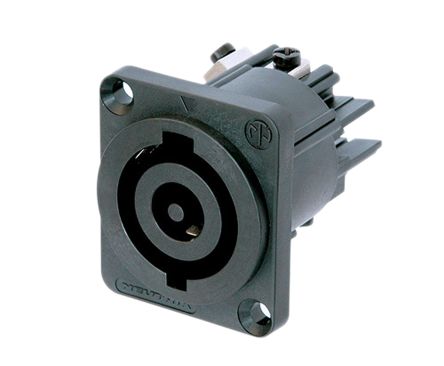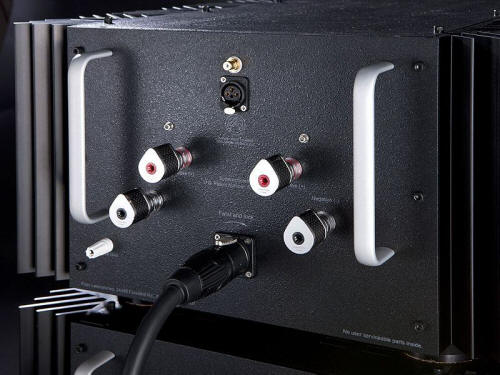I am designing and prototyping high quality audio devices to run from nominal 12VDC power supplies.
Most wall warts, and many existing 12VDC products use the ubiquitous 5.5mm/2.1mm DC plugs and sockets, or the 5.5mm/2.5mm variant.
I could use this system but it doesn't handle much current and the quality of connection is a bit, well, hit and miss.
So I am looking to spec a better grade of DC connector.
Cigarette lighter plugs are huge and grotty. There are lovely multipin locking mini-DINs but current capacity is an issue and they are not exactly a standard.
So called 'merit' plugs look interesting but they don't lock and I am not sure if they are really going to be adopted as a new standard. Standard XLR/Cannon type connectors scare me because there are so many variants used for so many different things. Microphone, speaker, mains voltage, who knows?
So, can anyone comment, or recommend a DC connector that is reliable, robust, easy to get and can handle at least 5Amps?
Any input much appreciated.
ps. The only reason I would like to use a reasonably common standard is to ensure that the products can have a reasonable lifespan and not be tied to a connector that drops out of use.
cheers, blakkington
Most wall warts, and many existing 12VDC products use the ubiquitous 5.5mm/2.1mm DC plugs and sockets, or the 5.5mm/2.5mm variant.
I could use this system but it doesn't handle much current and the quality of connection is a bit, well, hit and miss.
So I am looking to spec a better grade of DC connector.
Cigarette lighter plugs are huge and grotty. There are lovely multipin locking mini-DINs but current capacity is an issue and they are not exactly a standard.
So called 'merit' plugs look interesting but they don't lock and I am not sure if they are really going to be adopted as a new standard. Standard XLR/Cannon type connectors scare me because there are so many variants used for so many different things. Microphone, speaker, mains voltage, who knows?
So, can anyone comment, or recommend a DC connector that is reliable, robust, easy to get and can handle at least 5Amps?
Any input much appreciated.
ps. The only reason I would like to use a reasonably common standard is to ensure that the products can have a reasonable lifespan and not be tied to a connector that drops out of use.
cheers, blakkington

12V may be too low a voltage for 'high quality' audio, although it depends on exactly what you are doing. The nominal output from a typical digital source is 2V rms, which is nearly 6V pk-pk. When the signal swing approaches the supply rail voltage it gets harder to achieve low distortion, especially with discrete circuits.
When I worked for Soundfield microphones we used Lemo connectors extensively, really very nice, but you will pay for it.
Hirose have some fairly nice locking connectors for not too horrible money, widely used in field recording for 12V power, not as nice as the Lemo option but very much cheaper.
There are fake Lemo out there, which are nothing like as nice but are cheap.
73 Dan.
Hirose have some fairly nice locking connectors for not too horrible money, widely used in field recording for 12V power, not as nice as the Lemo option but very much cheaper.
There are fake Lemo out there, which are nothing like as nice but are cheap.
73 Dan.
Some of the common 12V connectors you mention are rated at 5A. I understand your reservations, but if you are designing a commercial standardized product in may be wise to keep it simple. DC Power Plugs | RS Components
1636 07 | Lumberg 1636, DC Adapter Rated At 10A, 24 V dc, Cable Mount, length 71.1mm, Nickel Plate | Lumberg
this lumberg one connects with a "click" to its counterpart chassis. the usual 5.5mm types drop out too easy
this lumberg one connects with a "click" to its counterpart chassis. the usual 5.5mm types drop out too easy
12V may be too low a voltage for 'high quality' audio, although it depends on exactly what you are doing. The nominal output from a typical digital source is 2V rms, which is nearly 6V pk-pk. When the signal swing approaches the supply rail voltage it gets harder to achieve low distortion, especially with discrete circuits.
Yes, there certainly are significant limits to what can be achieved with only 12V. The aim of the project is to look at ways to extend or overcome those limits if possible.
blakkhole
Doesn't neutrik make some jacks/plugs made for mains use and speakers? Just a thought.
Powercon and speakon, respectively. They would get my recommendation.
When I worked for Soundfield microphones we used Lemo connectors extensively, really very nice, but you will pay for it.
Hirose have some fairly nice locking connectors for not too horrible money, widely used in field recording for 12V power, not as nice as the Lemo option but very much cheaper.
There are fake Lemo out there, which are nothing like as nice but are cheap.
73 Dan.
The Lemo and Hirose connectors look great and I will probably use them if the products end up good enough to charge a premium price!
If they don't
 I might look at mini DIN/XLR as I have decided I want them to lock on.
I might look at mini DIN/XLR as I have decided I want them to lock on.Thanks all for your input !
blakktie
Powercon and speakon, respectively. They would get my recommendation.
Thanks for the suggestion. The Powercon connectors are a bit bulky at 26mm Diameter and 75mm long. As they are notionally for AC Mains voltages I would also be a bit concerned about the potential for mis-connection.
Certainly got me thinking, though.......
blakktop
Powercon and speakon, respectively. They would get my recommendation.
+1 on PowerCon

even this beast use it

Hi,
the afore mentioned Lumbergs are excellent for this kind of useage.
Look for types SV and WSV (connectors, straight and angular) and KFV (receptables).
They are built acc. to IEC 61076, which is basically the well known DIN-Type connector (think of NAIMs connectors or on some tonearms) with a threaded metal casing to safely secure the connectors on the receptable.
Available from 3-poles to 12-poles, with tongue and groove inlet for failsafe plugging.
Solder contacts are gold plated, for wires up to 0.75mm²/5A.
High surface finish quality and more expensive looks than they cost.
You can´t do wrong using those, if You can place the ~20mm OD on Your casing ;-)
jauu
Calvin
the afore mentioned Lumbergs are excellent for this kind of useage.
Look for types SV and WSV (connectors, straight and angular) and KFV (receptables).
They are built acc. to IEC 61076, which is basically the well known DIN-Type connector (think of NAIMs connectors or on some tonearms) with a threaded metal casing to safely secure the connectors on the receptable.
Available from 3-poles to 12-poles, with tongue and groove inlet for failsafe plugging.
Solder contacts are gold plated, for wires up to 0.75mm²/5A.
High surface finish quality and more expensive looks than they cost.
You can´t do wrong using those, if You can place the ~20mm OD on Your casing ;-)
jauu
Calvin
Doesn't neutrik make some jacks/plugs made for mains use and speakers? Just a thought.
That would be PowerCon and Speakon, both not intended for DC.
I'd take this series:
NC4FXX - Neutrik
and use each two pins in paralell.
If you go for 4 pole XLR there are industry standards for 12V pinning, please do not put power on a 3 pin XLR.
Definitely do NOT use speakon or powercon for DC on an audio product, far too much potential for a really expensive accident, they are excellent, but have well known defined roles and expected functions, the rule of least surprise applies here.
Regards, Dan.
Definitely do NOT use speakon or powercon for DC on an audio product, far too much potential for a really expensive accident, they are excellent, but have well known defined roles and expected functions, the rule of least surprise applies here.
Regards, Dan.
- Status
- This old topic is closed. If you want to reopen this topic, contact a moderator using the "Report Post" button.
- Home
- Design & Build
- Parts
- "Best" connector for DC power to audio stuff
